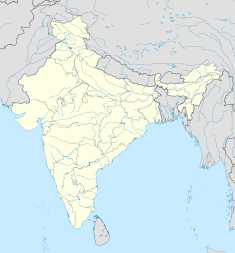User:KashKarti/sandbox
| Telhara | |
|---|---|
 | |
| Location | Telhara, Nalanda district |
| Nearest city | Bihar Sharif |
| Coordinates | 25°13′35″N 85°10′54″E / 25.226334°N 85.181587°E |
| Built | 1st-century CE |
| Governing body | Archaeological Survey of India |
Telhara (formerly known as Telāḍhaka) was a Buddhist monastic establishment in Nalanda district of Bihar,India dating back to the 1st-century CE and active till at least the 12th-century CE.[1] It is notable as it has been mentioned in the travelogues of Chinese monks including Xuanzang.[2]
History
[edit]It has been mentioned as Teladhaka in the writings of the Chinese traveller Hiuen Tsang, who visited the place in the 7th century CE.[3] It is mentioned in an inscription found at Nālandā which mentions a temple restored a man named Bālāditya, a Jyāvisa of Telāḍhaka who had emigrated from Kauśāmbī, in the eleventh year of Mahipala Deva. [4]
It has been also mentioned in the Ain-i-Akbari as Tiladah, and is shown as one of the 46 mahals (administrative units) of the Bihar sarkar. Telhara was shown as a pargana in the maps prepared by the East India Company administration during 1842–45.[5]
The ruins of Telhara were mentioned in an 1872 letter by A. M. Broadley, the then Magistrate of Nalanda. Broadley noted that a large number of stone and metal images were often found during the digging of graves at the top of one of the mounds. Metal images found were melted down.[6] The State Government of Bihar started a new archaeological excavation of the site in December 2009. The work unearthed ancient pottery, antiques, and the remains of a three-storeyed structure mentioned by Hiuen Tsang. Evidence of prayer halls and residential cells in the monastery have been found. The excavation revealed the following chronological layers:[5]

- Northern Black Polished Ware (3rd Century BCE)
- Kushan (1st century CE)
- Gupta (5th to 7th century CE)
- Pala (7th century to 11th century CE)
A number of sculptures from the site had been moved to museums during the British Raj. The Indian Museum in Kolkata houses the Maitreya and the twelve-armed Avalokiteswar images from Telhara. A Pala sculpture from the site is present at the Rietberg Museum in Zurich. Telhara has a mosque, which is said to have been built with the materials carried from the ruins of the Buddhist monastery.[5] One pillar contained an inscription that mentions the place-name Telāḍhaka.
Remains of an ancient university (Mahavihara) on the site were unearthed in 2014.[7][8]
A small museum named Baladitya Museum has been established to store some of the artifacts found.
References
[edit]- ^ Sanyal, Rajat (2016). "Discovery of a Buddhist Monastery at Telhara". Monthly Bulletin of the Asiatic Society.
- ^ Biswas, Pampa (2016). "Explored Sculptural Heritage of Telhara, District Nalanda, Bihar: A Recent Visit". Journal of the Directorate of Archaeology & Museums. 1: 167–183.
- ^ Leoshko, Janice (1988). "Buddhist Images from Telhara, a Site in Eastern India". South Asian Studies. 4: 90–97.
- ^ The Palas of Bengal, R. D. BANERJI, 1915
- ^ a b c Dr. Atul Kumar Verma. "Telhara (Nalanda) Excavation - A Brief Report (PDF)" (PDF). Retrieved 2014-01-15.
- ^ Explored Sculptural Heritage of Telhara, District Nalanda, Bihar: A Recent Visit, Pampa Biswas, Puravritta Volume 1, 2016, p. 167–182
- ^ "Another ancient university found in Nalanda | Patna News - Times of India".
- ^ "Telhara university".


